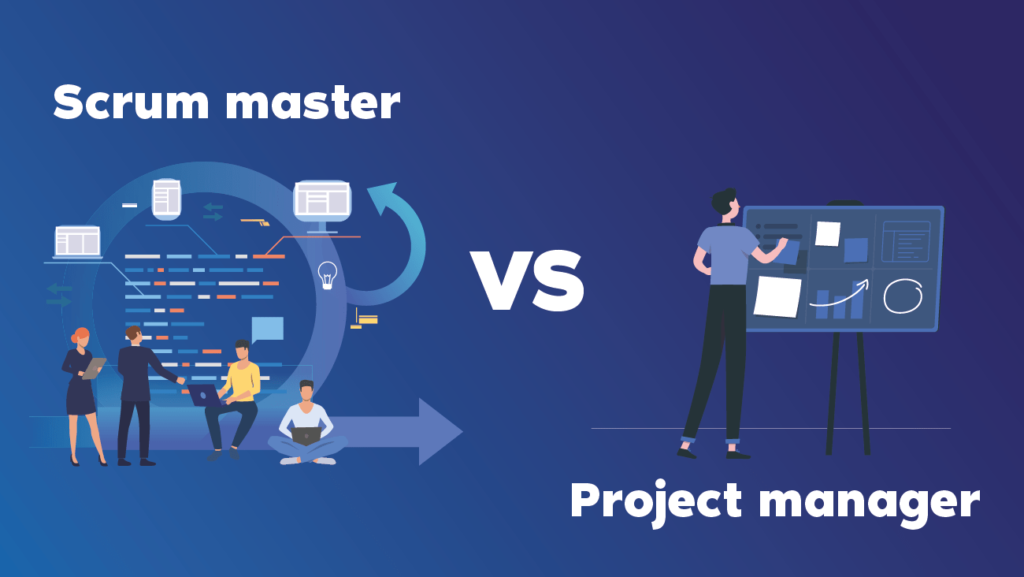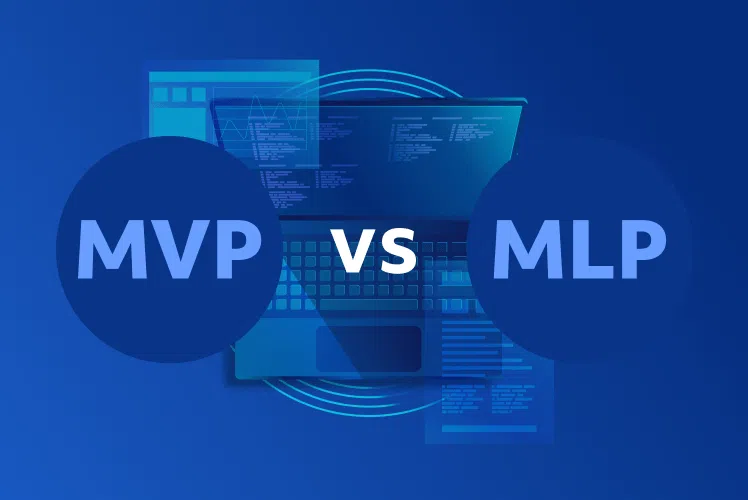Table of Contents
The development of a software product involves dozens of complex processes and all of them need to be managed properly in order to achieve the desired result. Depending on the development methodology, the project will require either a scrum master or a project manager.
It would not be correct to say that these two roles are identical but they do share several similarities. It is therefore important to understand every role in detail in order to assign the right professional who will be capable of guiding the project towards successful realization.

What is a scrum master?
A scrum master, as the name implies, works in scrum so you won’t see this role in waterfall or kanban. This person knows everything about scrum and teaches scrum methods and principles to all the people on a team.
It is, therefore, safe to say that a scrum master is not a manager but rather a servant leader whose main goal is to facilitate the development process and ensure everyone on the team understand the scrum principles and know how to use them.
Because scrum is quite a complex framework, every team member should understand it really well in order to execute the tasks in a well-organized and efficient manner. Here is where the scrum master steps in and takes the responsibility of explaining the intricacies of scrum to the team and ensures everyone knows what they are doing.
Main responsibilities
A scrum master works with both the product owner and the team and has quite a wide scope of responsibilities.
When working with the product owner, a scrum master will help with product backlog management and ensure the project goals and requirements are clear to the team. In this case, a scrum master acts as an intermediary between the product owner (who forms the project requirements) and the development team (who realizes them).
The role of a scrum master expands significantly when working with the development team. In this case, the main responsibilities include:
- Assistance and guidance with work in scrum
- Control of the work process so it adheres to scrum practices
- Meetings with the team in order to discuss the work results and future sprints
- Elimination of impediments (i.e. lengthy approval processes, outdated tools, or slow feedback from other departments)
Finally, a scrum master updates the stakeholders on the project status and makes sure everyone on the team is on the same page.
Is the scrum master a project manager?
A scrum master is not a project manager in the traditional sense but this person indeed manages the project and oversees all scrum-related processes in order to ensure seamless project execution.
So while a scrum master does not work either with the budget or with task assignments, he still manages the project in terms of delivering the results and ensuring their quality.
What is a project manager?
A project manager leads the project from the beginning to the end and manages numerous aspects. While the main focus of a scrum master is quality and adherence to scrum, a PM also works on the timely results delivery, budget, goal setting, allocation of the available resources and assignment of the right people to the right tasks.
Another area of responsibility of a project manager is close communication with stakeholders and the product owner. This is needed in order to keep all the involved parties updated on the project status and progress. For that, a PM needs to have excellent communication and leadership skills.
One more important thing that project managers work with is change management. The development of any software product includes unplanned requests for changes in the project requirements. In order to implement these changes without affecting the project status, it is important to have a knowledgeable PM who can seamlessly implement these changes and keep up the project workflow.
The key responsibilities of a project manager include:
- Budget management and allocation
- Assignment of people to the tasks
- Change management
- Negotiation and communication with stakeholders
- Risk management
- Monitoring and management of the project workflow and status and its adherence to the set goals
- Identification of the necessary resources and their allocation
Do you need a Project Manager for an Agile project?
This is a tricky question but we would say that it is 100% yes.
Every software development project needs a person who will manage the execution of the tasks, monitor and control the development team, and check the compliance of the results with the set goals. Some people say that Agile projects do not need a PM because the team is self-organized and everyone understands their tasks. However, the development team does not have a vision of a final product – while the PM has. Thus, a project manager guides the team towards the end goal without interfering with their everyday tasks.
Another important aspect of project management is the optimization and improvement of the team’s dynamics. Team dynamics implies the underlying psychological factors that impact the team’s performance and behavior. A project manager is a person who can influence these factors, timely identify any internal issues and efficiently resolve them.
The key similarities between a scrum master and a project manager
As said above, the role of a scrum master includes certain managerial tasks. Here are the main similarities between a scrum master and a project manager:
- Ongoing communication with the team and all the parties involved
- Management of the processes and their control
- Definition of the project goals
- Management of the team dynamics
Both roles require strong communication and leadership skills as well as analytical thinking and problem-solving skills. As well, both roles require strong experience in the industry and general understanding of it.
The key differences between a scrum master and a project manager
Despite the abovementioned similarities, there are also certain differences between the responsibilities of a scrum master and a project manager:
- Methodology: a scrum masters work only in scrum and a PM can work in any development methodology.
- Focus: a scrum master mostly focuses on the work quality while a project manager keeps in mind all aspects of the project development.
- Scope: a scrum master typically works in a small team while a PM oversees the work of the whole team, including developers, designers, QA engineers, etc.
- Specifics: a scrum master focuses on scrum only while the role of a project manager implies a deep understanding of all business processes and their peculiarities.
Which specialist does your project actually need?
For projects in scrum, it is reasonable to attract a scrum master who will manage the project and ensure everyone is on the same page. However, if there is no such a specialist on a team, it will be OK to assign a Project Manager or even a team lead – in other words, any person who is qualified enough to monitor the project status and keep the work going. For projects in waterfall or kanban, you will need an experienced PM.
Why is a project manager so important?
It may happen that clients do not fully understand the significance of a manager’s role in the project development process so they do not pay enough attention to assigning the right person in this position.
However, the role of a project manager is incredibly significant. Here are all the benefits that this person brings to a project.
Project direction
As we already said, the members of the development team focus on their specific tasks and stakeholders may not know all the intricacies of the development. So a project manager is the only person who has both the vision of a final product and a deep understanding of all internal processes. As a result, he can direct the project and ensure it doesn’t get off the tracks.
Project planning
Before starting any work, it is obligatory to allocate the budget and resources as well as assign people to specific tasks. So the goal of a PM here is to arrange the work in such a way that the development team meets the project requirements within a specified budget and timeline.
Change management
In every software project, sudden changes will occur and it’s the responsibility of a project manager to efficiently manage them.
A change in the requirements may happen due to a number of reasons, such as change of the client’s mind or changes in the market. In this case, a PM needs to prioritize the requirements and organize them in such a way so that the change implementation does not hurt the development process.
Project control
While a scrum master takes a close look at all scrum-related processes, a project manager oversees the whole project. He checks whether team members meet the deadlines and whether there are enough resources, time, and budget to fulfill the set goals.



Comments